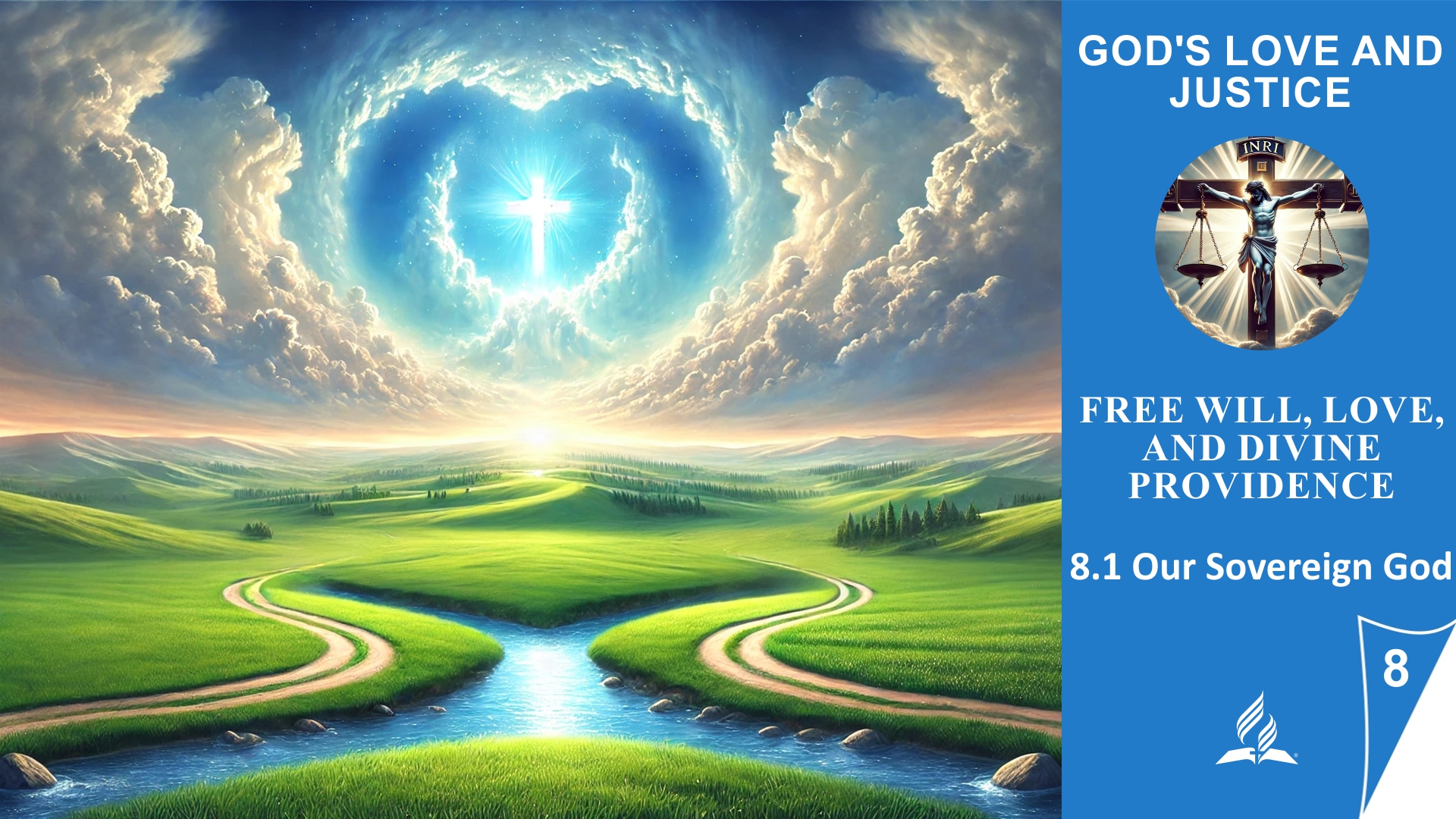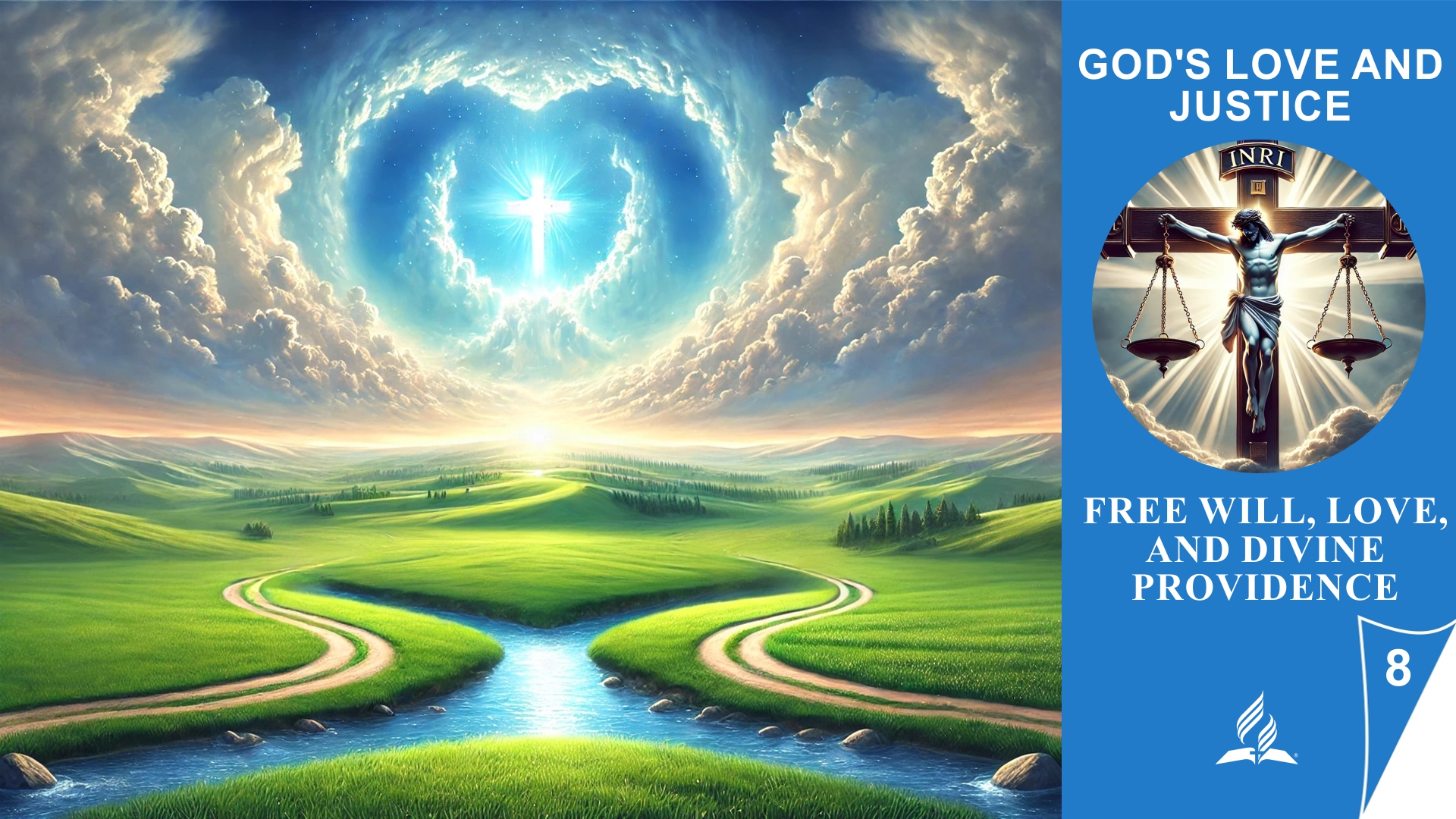


Lesson 8.Free Will, Love, and Divine Providence
Free Will, Love, and God’s Work in the World
Why is there suffering in a world created by an almighty and loving God? How do God’s providence and human freedom fit together? These questions touch on fundamental aspects of our faith and our relationship with God. In Lesson 8, we explore the fascinating interplay between God’s omnipotence, human free will, and His infinite love.
God is the ruler of the world, yet He forces no one. He invites, guides, and loves—but He respects the freedom He has given us. This freedom is a gift but also brings responsibility. Suffering, injustice, and pain are often the consequences of human choices or the fallen state of the world—not the result of an arbitrary God. And yet, we can know: God is sovereign. Even when we do not fully understand His ways, He works to turn everything for good.
This lesson invites us to reflect on how God’s omnipotence, His love, and our free will interact. It shows that true love cannot be forced and that God’s guidance remains reliable even in difficult times. No matter how complex life seems, God’s heart beats for us, and He walks with us on our journey.

8.1 Our Sovereign God
God’s Will and Human Decisions
The idea that God, as the sovereign ruler, directly controls everything that happens—whether good or bad—and causes every event to occur exactly as He desires leads to theological challenges. An all-powerful God could theoretically direct everything according to His will, yet the Bible shows that God has given human beings free will. This means that not everything that occurs in the world necessarily corresponds to God’s original will.
A crucial point is that God’s reign should not be equated with an authoritarian intervention in every single situation. God has given humanity the freedom to make choices that often run contrary to His ideal purpose. The pain and suffering we experience are frequently the consequences of these choices or the natural result of a fallen world.
God’s sovereignty does not mean that He causes evil or wills every tragedy. Rather, He accompanies us through our challenges, helps us during difficult times, and even uses hard situations to foster our spiritual growth. An understanding of God’s rule that fails to distinguish between His ideal will and the state of the world distorted by sin can easily lead to misconceptions about God’s character.
God is the ruler, but He exercises His power with love and patience. He does not force but invites. He provides guidance while respecting human free will. His goal is not to arbitrarily permit or cause suffering but to lead us, through His providence, into a life in relationship with Him.
Read Psalm 81:12–15; Isaiah 30:15,18; Isaiah 66:4; and Luke 13:34. What do these texts say about whether God’s will is always fulfilled?
The Bible clearly shows us that God’s will does not always occur because He has given humanity the freedom to make their own decisions. In the cited passages, it becomes apparent that God desires His people to follow Him, yet often they reject His will. This means that not everything that happens in the world is automatically God’s will—instead, we experience the consequences of human choices that frequently contradict God’s intentions.
Psalm 81:12–15 reveals God’s longing to bless and guide His people, but their stubbornness prevents this. Isaiah 30:15,18 shows that God’s plan is for salvation and rest for His people, yet many refuse to trust Him. Isaiah 66:4 emphasizes that God has made His will known to humanity, yet they consciously choose the opposite. Finally, Luke 13:34 presents the painful picture of a loving God who wishes to gather His people like a hen gathers her chicks, but they reject Him.
These passages illustrate a profound truth: God does not force anyone to do His will. He calls, invites, and appeals to our hearts—but He respects human freedom. This results in many things occurring that do not align with His ideal will. Yet, despite rejection and disobedience, God’s love remains, and He continues to seek ways to bring people back to Himself.
Consider the implications of a theology that attributes everything that happens directly to God’s will. What deep problems, especially concerning evil, would such a theology raise?
A theology that teaches that everything that happens is exactly the direct will of God leads to significant theological and ethical problems—particularly regarding evil and suffering in the world.
-
God Would Be Held Responsible for Evil
-
If every event—including wars, natural disasters, diseases, or personal suffering—were God’s direct decision, it would mean that God consciously and deliberately causes evil. This contradicts the biblical revelation of a just and loving God (1 John 4:8).
-
-
Human Free Will Would Be Meaningless
-
The Bible repeatedly shows that God gives human beings the freedom to choose for or against Him. If everything were determined directly by God, there would be no true freedom of choice, and concepts such as responsibility, sin, and obedience would become meaningless.
-
-
Suffering and Injustice Would Be Seen as God’s Will
-
Such a theology could lead people to passively accept suffering rather than actively pursuing justice and compassion. If one assumes that everything is God’s will, one might avoid addressing how to respond to injustice and suffering.
-
-
God’s Justice and Love Would Be Questioned
-
How could a just and merciful God desire that children suffer, that people are treated cruelly, or that innocent individuals become victims of disasters? A theology attributing everything to God’s direct will could raise doubts about His character and shake the faith of many.
-
-
Prayer and the Faith in Change Would Become Meaningless
-
If everything happens exactly as God wills, it would be pointless to pray or hope for change. However, the Bible clearly demonstrates that prayer and faith play an important role, and that God delights in the responses of His creatures (e.g., 2 Chronicles 7:14).
-
Biblical Perspective: God’s Sovereign Will and Human Decisions
The Bible shows that while God is sovereign, He does not directly cause every single event. He has given human beings freedom and often works through His providence, even using difficult situations to bring about good (Romans 8:28). Yet there are things that do not align with His ideal will—such as sin, injustice, and the rejection of His love.
A biblically balanced theology acknowledges that God is sovereign while also granting human freedom. The evil in the world is not God’s direct intention but a consequence of human decisions and a fallen creation. Still, God remains the Lord over history and works to bring everything to good, without nullifying human free will.
Understanding that God is the sovereign ruler but does not directly cause or enforce every event has profound implications for our faith and our daily lives.
-
Responsibility for Our Decisions
-
We are not puppets of God; we have the freedom to make our own decisions. This also means that we are responsible for our actions. Our moral choices have consequences, and we should consciously seek God’s will rather than blindly blame Him for everything.
-
-
God Is Not the Author of Suffering but Our Companion
-
In difficult times, we can be assured that God does not cause our suffering; He walks with us through the hardships. He uses challenges to strengthen us and bring us closer to Him (Romans 8:28). Knowing this can provide us with comfort and hope, even when we do not understand everything.
-
-
Prayer as an Active Relationship with God
-
When we believe that not everything is directly willed by God, we recognize that our prayers have meaning. Prayer is not merely a ritual but a means to engage in dialogue with God, to seek His will, and to experience His guidance in our lives.
-
-
Practicing Justice and Compassion
-
Instead of accepting injustice as “God’s will,” the Bible calls us to actively oppose wrongdoing and suffering. God desires that we stand up for the weak, practice mercy, and embody love (Micah 6:8).
-
-
God Forces No One—Not Even Us
-
Because God grants us freedom, we should not impose our faith on others. True faith grows from a voluntary relationship with God, not from coercion or fear. This encourages us to live our faith authentically and to lovingly invite others, rather than judge them.
-
Summary
Our daily lives and our faith are deeply connected to our understanding of God’s reign. He is not a tyrant who manipulates everything but a loving Father who grants us freedom. This freedom brings responsibility, but also the wonderful opportunity to consciously respond to God’s love. By actively working for justice, trusting God in prayer, and knowing that He accompanies us in difficult times, we can come to recognize His true character and align our lives with His will.
God’s love does not force—it invites; true devotion comes from a willing heart.
(Visited 51 times, 1 visits today)























